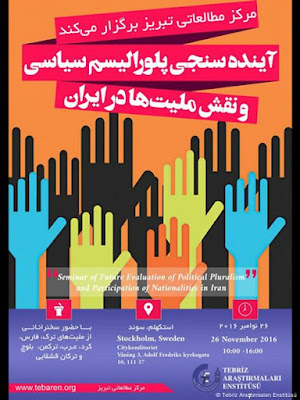Taher Shir Mohammadi - Nov 28, 2016 - DW Persian
 |
| Conference Participants |
The two-day international seminar on "Futures Studies of Political Pluralism and the Role of Nationalities in Iran," organized by the Tabriz Studies Center, concluded in Stockholm on November 26 and 27, 2016, focusing on pluralism, secular democracy, and ethnic issues.
Alirza Ardabili, the managing director of the "Tribune" website and one of the participants in the seminar, told Deutsche Welle that representatives and speakers from Turk, Kurdish, Arab, Baluch, Turkmen, and Qashqai Turkish ethnic groups participated in the two-day meeting of the "Tabriz Studies Center." According to Mr. Ardabili, speakers from the United States, Iran, Switzerland, the United Kingdom, and Turkey attended the meeting. He emphasized that this seminar was held for the first time at such a level by the Tabriz Studies Center in Europe.
Tabriz Studies Center
The Tabriz Studies Center began its activities on April 2, 2016, in Ankara. Dr. Mohammad Reza Hayat, the head of the Tabriz Studies Center, stated that this center is a civil institution and an "NGO," with no connection to the Turkish government, Azerbaijan, or any other governments. According to Hayat, issues related to Turkey are not part of the center's agenda or research scope.
Regarding the Stockholm seminar, he told Deutsche Welle: "Considering that this center was not well-known, the response has been good, and almost all the representatives who accepted our invitation attended the seminar. We had previously held several seminars in Turkey and decided to hold a seminar in Europe, the capital of Sweden. We invited two representatives from each major ethnic group in Iran, and these representatives actively participated in the seminar."
Goals and Outcomes of the Stockholm Seminar
Mohammad Reza Hayat explains the main objective of holding this seminar: "We are witnessing serious crises in the region, and these crises are mostly due to ethnic and religious discrimination. Iran is also a multi-ethnic and multi-national country. We tried to address this issue and, before a similar situation like that in Syria and Iraq occurs in Iran or foreign interventions take place in the future, we wanted to see if understanding could be established among these nationalities, to highlight commonalities and reach a conclusion."
The managing director of the Tabriz Studies Center further adds, "It became clear in this seminar that almost all groups share common views on certain issues. For instance, we emphasized that the centralized system must change, without necessarily discussing a federal system, and that the country's issues should be resolved based on a decentralized system. In our view, the centralized system cannot work in Iran, just as it has not met the needs of the people and citizens of Iran over the past hundred years. There should also be measures to preserve languages, cultures, religions, and traditions, with mutual respect. We also discussed the role of ethnic groups in the governance of the country, both in ethnic regions and in the central government."
According to Hayat, if the ethnic issue in Iran is not resolved fairly, the divide between nationalities will increasingly grow, potentially leading to severe conflicts, even war and bloodshed, similar to what we are currently witnessing in Iraq and Syria.
Dr. Hayat emphasized that, unlike previous conferences, this time we examined the issues with a solutions-oriented perspective.
 |
Two-Day Seminar on 'Futures Studies of Political Pluralism and the Role of Nationalities in Iran' |
